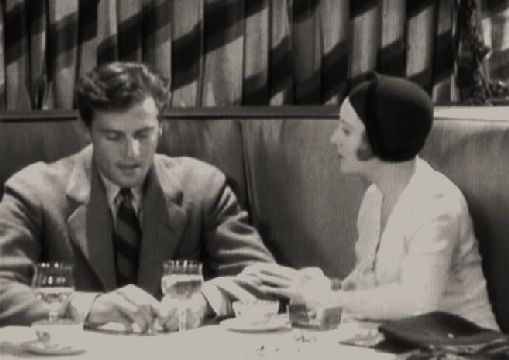Kept Husbands (1931) 

Director: Lloyd Bacon
Cast: Clara Kimball Young, Joel McCrea, Dorothy Mackaill
Synopsis: Blue collar steelworker Richard Brunton saves two of his fellow workers after an accident at a factory. In gratitude, his boss, millionaire Arthur Parker invites Richard for dinner…
Given that at the time of its release many in the audience for Lloyd Bacon’s comedy-drama Kept Husbands were suffering the indignities imposed upon them by the worst global economic depression known to man, it’s easy to imagine that not too many of them would have much sympathy for the plight of its hero. Richard ‘Dick’ Brunton (Joel McCrea) is a strapping All-American young man, a former high school football hero who is making his way in the world as an employee with Parker Steel. At some point before the movie, he saved the lives of a number of colleagues. Unless I wasn’t paying attention we’re never told quite how he did it, so it no doubt must have been in a manner that was far too expensive for the movie’s budget to cope with. Anyway, by way of reward, and seeing as how he won’t accept the $1,000 offered by grateful boss Arthur Parker (Robert McWade), he’s invited to dinner at the old man’s home, much to the dismay of his wife (Florence Roberts) and daughter, Dot (Dorothy Mackaill).
However, rather than the uncouth, overall-clad working, tobacco-chewing, pail-swinging Joe they had expected, the ladies of the Parker household are pleased to discover that Dick is actually a polite, well-mannered and good-looking young man, and by the time dinner is over Dot informs her father that she intends to make Dick her husband.
And that’s just what she does. It takes a little doing, though. In fact, Dot gets so fed up waiting for Dick to pop the question that she proposes to him, refusing to take no for an answer. But life as the son-in-law of the wealthy boss soon proves to be a disappointment for her new husband. After an extended honeymoon on Dad’s yacht, Dick returns to work to find he’s been kicked upstairs and given a big new office in which he whiles away his days learning how to play bridge while his bored secretary reads her book. Even worse than that is the way he has to accompany his new wife on an endless merry-go-round of social engagements which require him to socialise with shallow playboys and their playthings. Naturally, it’s only a matter of time before the strain begins to show in the newlywed’s marriage.
See what I mean about audiences not having much sympathy for poor Dick, who has a saucy young wife and untold riches thrust upon him? Ok, it’s fairly emasculating, but it surely beats standing in a bread line. And yet depression-era audiences lapped up this kind of stuff because, apparently, it gave them a brief escape from the hardship of their lives. Kept Husbands’ slight story is built around this wish-fulfilment fantasy, but it also reminds its audience that personal integrity is more important than material wealth. There’s a lot of talk along the way, because the movie was released when talkies were still relatively new, but it’s still reasonably entertaining despite this.
Kept Husbands is careful to show the wealthy in a worse light than those from Dick’s neck of the wood. Dot’s parents might have the bigger, better Christmas tree, but Dick’s mum (Mary Carr) runs a happier home and his folks have a much better understanding of what’s important in life. But the movie also ensures it doesn’t show the wealthy in a way that will turn the audience against them. They may be flippant and frivolous and have nothing in common with working class people, but the codes by which they live are roughly in line with their less wealthy counterparts. Dot may be spoiled and manipulative, but she remains likeable throughout thanks to the skill of the writers and a winning performance from Dorothy Mackaill. Even her potential lover, who makes a move when Dot’s marriage is in trouble, quickly and graciously steps down when she makes it clear she’s going to give married life another shot.
The only truly sour note struck by Kept Husbands is the excruciating performance of Ned Sparks in what’s supposed to be the comic relief as Mrs Brunton’s lodger. While it’s true that speaking lines in front of the camera was still a relatively new experience for many screen actors, Sparks reads his lines as if he’s playing the part of a not-very-bright puppet mule and the movie is all the poorer for his presence. His character is quite annoying as well, constantly coming out with dull nuggets of wisdom that are neither funny nor relevant.
For all the saucy goings on and emasculating shenanigans of the wilful Dot Parker the movie’s message is a traditional one which is spelled out for its audience by Dick’s mum as she advises the newly brought-to-heel Dot that the only way in which husbands should be kept is by love, devotion and sacrifice. I hope all you ladies are listening out there…
(Reviewed 8th January 2014)
httpv://www.youtube.com/watch?v=HPc1AMm4gPo
